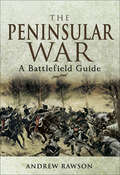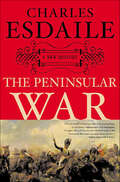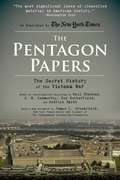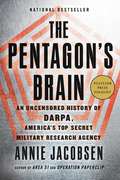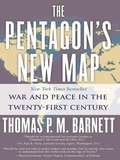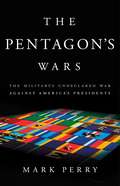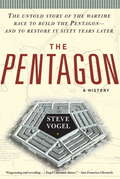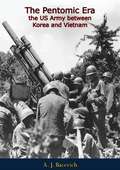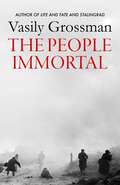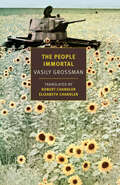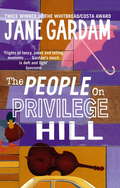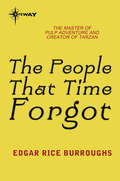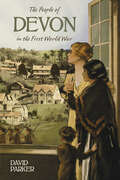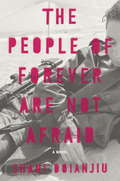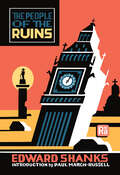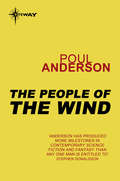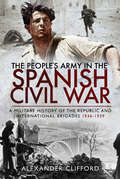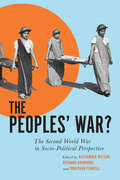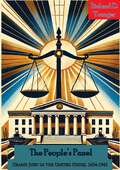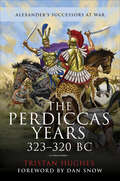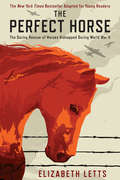- Table View
- List View
The Peninsular War: A Battlefield Guide
by Andrew RawsonA new battlefield guide to the Peninsular War is long overdue. Modern development in Spain and Portugal has encroached on many of the battlefields, new research has questioned established interpretations of events, and there is a broader appreciation of the parts played by all the armies involved - the French on one side and the Spanish, Portuguese and British on the other. Andrew Rawson, in this highly illustrated and practical guide, offers a wide-ranging, up-to-date and balanced account of this prolonged conflict, and he guides the reader and the visitor across the terrain over which the armies marched and fought. He reconstructs the major battles in graphic detail, and provides practical tours of the major battlefields and campaigns. Also included are sections examining the armies, the military organization and tactics of the time and the role of the Spanish guerrillas. This guide to the Peninsular War will be essential reading for anyone who wants a concise and accessible introduction to the conflict, and it will serve as an invaluable reference guide for visitors who want to explore the sites of the fighting two centuries ago.
The Peninsular War: A New History
by Charles EsdaileA stunning look at Napoleon's campaign across the Iberian peninsula from historian Charles Esdaile.At the end of the 18th century Spain remained one of the world's most powerful empires. Portugal, too, was prosperous at the time. By 1808, everything had changed. Portugal was under occupation and ravaged by famine, disease, economic problems and political instability. Spain had imploded and worse was to come. For the next six years, the peninsula was the helpless victim of others, suffering perhaps over a million deaths while troops from all over Europe tore it to pieces. Charles Esdaile's brilliant new history of the conflict makes plain the scope of the tragedy and its far-reaching effects, especially the poisonous legacy that produced the Spanish civil war of 1936-39.
The Pentagon Papers: The Secret History of the Vietnam War
by Neil Sheehan Fox Butterfield Hedrick Smith E. W. Kenworthy James L. Greenfield“The WikiLeaks of its day” (Time) is as relevant as ever to present-day American politics.“The most significant leaks of classified material in American history.” –The Washington PostNot Fake News! The basis for the 2018 film The Post by Academy Award-winning director Steven Spielberg, The Pentagon Papers are a series of articles, documents, and studies examining the Johnson Administration’s lies to the public about the extent of US involvement in the Vietnam War, bringing to light shocking conclusions about America’s true role in the conflict.Published by The New York Times in 1971, The Pentagon Papers riveted an already deeply divided nation with startling and disturbing revelations about the United States' involvement in Vietnam. The Washington Post called them “the most significant leaks of classified material in American history” and they remain relevant today as a reminder of the importance of a free press and First Amendment rights. The Pentagon Papers demonstrated that the government had systematically lied to both the public and to Congress.This incomparable, 848-page volume includes:The Truman and Eisenhower Years: 1945-1960 by Fox ButterfieldOrigins of the Insurgency in South Vietnam by Fox ButterfieldThe Kennedy Years: 1961-1963 by Hedrick SmithThe Overthrow of Ngo Dinh Diem: May-November, 1963 by Hedrick SmithThe Covert War and Tonkin Gulf: February-August, 1964 by Neil SheehanThe Consensus to Bomb North Vietnam: August, 1964-February, 1965 by Neil SheehanThe Launching of the Ground War: March-July, 1965 by Neil SheehanThe Buildup: July, 1965-September, 1966 by Fox ButterfieldSecretary McNamara’s Disenchantment: October, 1966-May, 1967 by Hedrick SmithThe Tet Offensive and the Turnaround by E. W. Kenworthy Analysis and CommentCourt RecordsBiographies of Key FiguresWith a brand-new foreword by James L. Greenfield, this edition of the Pulitzer Prize–winning story is sure to provoke discussion about free press and government deception, and shed some light on issues in the past and the present so that we can better understand and improve the future.
The Pentagon's Brain: An Uncensored History of DARPA, America's Top-Secret Military Research Agency
by Annie JacobsenThe definitive history of DARPA, the Defense Advanced Research Project Agency, from the author of the New York Times bestseller Area 51 No one has ever written the history of the Defense Department's most secret, most powerful, and most controversial military science R&D agency. In the first-ever history about the organization, New York Times bestselling author Annie Jacobsen draws on inside sources, exclusive interviews, private documents, and declassified memos to paint a picture of DARPA, or "the Pentagon's brain," from its Cold War inception in 1958 to the present.This is the book on DARPA--a compelling narrative about this clandestine intersection of science and the American military and the often frightening results.
The Pentagon's New Map
by Thomas P.M. BarnettSince the end of the Cold War, America's national security establishment has been searching for a new operating theory to explain how this seemingly "chaotic" world actually works. Gone is the clash of blocs, but replaced by what? Thomas Barnett has the answers. A senior military analyst with the U.S. Naval War College, he has given a constant stream of briefings over the past few years, and particularly since 9/11, to the highest of high-level civilian and military policymakers-and now he gives it to you. The Pentagon's New Map is a cutting-edge approach to globalization that combines security, economic, political, and cultural factors to do no less than predict and explain the nature of war and peace in the twenty-first century. Building on the works of Friedman, Huntington, and Fukuyama, and then taking a leap beyond, Barnett crystallizes recent American military history and strategy, sets the parameters for where our forces will likely be headed in the future, outlines the unique role that America can and will play in establishing international stability-and provides much-needed hope at a crucial yet uncertain time in world history. For anyone seeking to understand the Iraqs, Afghanistans, and Liberias of the present and future, the intimate new links between foreign policy and national security, and the operational realities of the world as it exists today, The Pentagon's New Map is a template, a Rosetta stone. Agree with it, disagree with it, argue with it-there is no book more essential for 2004 and beyond.
The Pentagon's New Map
by Thomas P.M. BarnettSince the end of the Cold War, America's national security establishment has been searching for a new operating theory to explain how this seemingly "chaotic" world actually works. Gone is the clash of blocs, but replaced by what? Thomas Barnett has the answers. A senior military analyst with the U.S. Naval War College, he has given a constant stream of briefings over the past few years, and particularly since 9/11, to the highest of high-level civilian and military policymakers-and now he gives it to you. The Pentagon's New Map is a cutting-edge approach to globalization that combines security, economic, political, and cultural factors to do no less than predict and explain the nature of war and peace in the twenty-first century. Building on the works of Friedman, Huntington, and Fukuyama, and then taking a leap beyond, Barnett crystallizes recent American military history and strategy, sets the parameters for where our forces will likely be headed in the future, outlines the unique role that America can and will play in establishing international stability-and provides much-needed hope at a crucial yet uncertain time in world history. For anyone seeking to understand the Iraqs, Afghanistans, and Liberias of the present and future, the intimate new links between foreign policy and national security, and the operational realities of the world as it exists today, The Pentagon's New Map is a template, a Rosetta stone. Agree with it, disagree with it, argue with it-there is no book more essential for 2004 and beyond.
The Pentagon's New Map: War and Peace in the Twenty-First Century
by Thomas P. M. BarnettAnalysis of how the world is changing with respect to power and possibilities.
The Pentagon's Wars: The Military's Undeclared War Against America's Presidents
by Mark PerryA gripping insider account of the clash between America's civilian and military leadershipThe Pentagon's Wars is a dramatic account of the deep and divisive debates between America's civilian leaders and its military officers. Renowned military expert Mark Perry investigates these internal wars and sheds new light on the US military-the most powerful and influential lobby in Washington. He reveals explosive stories, from the secret history of Clinton's "don't ask, don't tell" policy to how the military plotted to undermine Barack Obama's strategy in Afghanistan, to show how internal strife and deep civilian-military animus shapes America's policy abroad, often to the nation's detriment.Drawing on three decades of high-profile interviews, both on and off the record, Perry yields sobering judgments on the tenures of our nation's most important military leaders. The Pentagon's Wars is essential reading for anyone seeking to understand the inner workings of the making of America's foreign policy.
The Pentagon: The Untold Story of the Wartime Race to Build the Pentagon--and to Restore It Sixty Years Later
by Steve VogelThe creation of the Pentagon in seventeen whirlwind months during World War II is one of the great construction feats in American history, involving a tremendous mobilization of manpower, resources, and minds. In astonishingly short order, Brigadier General Brehon B. Somervell conceived and built an institution that ranks with the White House, the Vatican, and a handful of other structures as symbols recognized around the world. Now veteran military reporter Steve Vogel reveals for the first time the remarkable story of the Pentagon's construction, from it's dramatic birth to its rebuilding after the September 11 attack. At the center of the story is the tempestuous but courtly Somervell-"dynamite in a Tiffany box," as he was once described. In July 1941, the Army construction chief sprang the idea of building a single, huge headquarters that could house the entire War Department, then scattered in seventeen buildings around Washington. Somervell ordered drawings produced in one weekend and, despite a firestorm of opposition, broke ground two months later, vowing that the building would be finished in little more than a year. Thousands of workers descended on the site, a raffish Virginia neighborhood known as Hell's Bottom, while an army of draftsmen churned out designs barely one step ahead of their execution. Seven months later the first Pentagon employees skirted seas of mud to move into the building and went to work even as construction roared around them. The colossal Army headquarters helped recast Washington from a sleepy southern town into the bustling center of a reluctant empire. Vivid portraits are drawn of other key figures in the drama, among them Franklin D. Roosevelt, the president who fancied himself an architect; Secretary of War Henry L. Stimson and Army Chief of Staff General George C. Marshall, both desperate for a home for the War Department as the country prepared for battle; Colonel Leslie R. Groves, the ruthless force of nature who oversaw the Pentagon's construction (as well as the Manhattan Project to create an atomic bomb); and John McShain, the charming and dapper builder who used his relationship with FDR to help land himself the contract for the biggest office building in the world. The Pentagon's post-World War II history is told through its critical moments, including the troubled birth of the Department of Defense during the Cold War, the tense days of the Cuban Missile Crisis, and the tumultuous 1967 protest against the Vietnam War. The pivotal attack on September 11 is related with chilling new detail, as is the race to rebuild the damaged Pentagon, a restoration that echoed the spirit of its creation. This study of a single enigmatic building tells a broader story of modern American history, from the eve of World War II to the new wars of the twenty-first century. Steve Vogel has crafted a dazzling work of military social history that merits comparison with the best works of David Halberstam or David McCullough. Like its namesake, The Pentagon is a true landmark. "Among books dealing with seemingly impossible engineering feats, this easily ranks with David McCullough's The Great Bridge and The Path Between the Seas, as well as Ross King's Brunelleschi's Dome. " -Kirkus Reviews (Starred Review) "Vogel artfully weaves architectural and cultural history, thus creating a brilliant and illuminating study of this singular (and, in many ways, sacred) American space. " -Publishers Weekly (Starred Review) "An amazing story, expertly researched and beautifully told. Part history, part adventure yarn, The Pentagon is above all else the biography of an American icon. "
The Pentomic Era: The US Army between Korea and Vietnam
by A. J. BacevichThis essay is a brief history of the U.S. army during the years immediately following the Korean War. For many in our own time that period—corresponding to the two terms of the Eisenhower presidency—has acquired an aura of congenial simplicity. Americans who survived Vietnam, Watergate, and painful economical difficulties wistfully recall the 1950s as a time when the nation possessed a clearly-charted course and had the will and the power to follow it.
The People Immortal
by Vasily GrossmanOne of Grossman's three great war novels - alongside Life and Fate and Stalingrad."A significant, valuable addition to Grossman's small but powerful body of work" WILLIAM BOYD"A remarkable novel that illuminates the terrible realities of Barbarossa and the banal horror of warfare with incomparable understanding and insight" JONATHAN DIMBLEBY"There are always good reasons for reading Grossman, but few times are as resonant as our own" Financial Times"At the heart of his writing lies a tireless humanity and empathy" Telegraph"Grossman combines a journalist's eye with a novelist's empathy" SpectatorSet during the catastrophic defeats of the war's first months, it tracks a Red Army regiment that wins a minor victory in eastern Belorussia but fails to exploit this success. A battalion is then entrusted with the task of slowing the German advance, and eventually encircled, before ultimately breaking out and joining with the rest of the Soviet forces.Grossman's descriptions of the natural world - and his characters' relationship to it - are both vivid and unexpected, as are his memorable character sketches: eleven-year-old Lionya is determined to hang on to his toy revolver as he walks a long distance behind German lines; his defiant grandmother slaps a German officer in the face and is shot; Kotenko, a fiercely anti-Soviet peasant who initially welcomes the Germans, hangs himself in despair when they treat him with contempt; and Semion Ignatiev, a womanizer and gifted story-teller, turns out to be the boldest and most resourceful of the rank-and file soldiers.Grossman spent most of the war years close to the front line. But The People Immortal is far from being mere morale-boosting propaganda. On the contrary, as letters included in this volume make clear, it was read as a textbook, and as a work of military education. This edition includes not only the unredacted novel itself, translated here for the first time since 1946, but also a wealth of background material.A heavily redacted English translation of The People Immortal was published in 1946. This current edition is the first that reflects Grossman's original text.Translated from the Russian by Robert and Elizabeth Chandler
The People Immortal
by Vasily GrossmanThe first war novel by the author of Life and Fate and a stunningly accurate portrayal of soldierly life written at the beginning of World War II.Vasily Grossman wrote three novels about the Second World War, each offering a distinct take on what a war novel can be, and each extraordinary. A common set of characters links Stalingrad and Life and Fate, but Stalingrad is not only a moving and exciting story of desperate defense and the turning tide of war, but also a monumental memorial for the countless war dead. Life and Fate, by contrast, is a work of moral and political philosophy as well as a novel, and the deep question it explores is whether or not it is possible to behave ethically in the face of overwhelming violence. The People Immortal is something else entirely. Set during the catastrophic first months of the German invasion of the Soviet Union, this is the tale of an army battalion dispatched to slow the advancing enemy at any cost, with encirclement and annihilation its promised end. A rousing story of resistance, The People Immortal is the novel as weapon in hand.
The People On Privilege Hill
by Jane GardamIt is a wet day in Dorset, and walking to a luncheon party is Sir Edward Feathers QC, followed by two elderly friends: his scruffy neighbour and sparring partner, Veneering, and Fiscal-Smith, the meanest lawyer ever to make a fortune at the Bar. Fans of Jane Gardam's bestselling novel, OLD FILTH, will be delighted to encounter Filth, now almost ninety, making his immaculate way to Privilege Hill, named perhaps for the Prive-Lieges who arrived with the Normans, but more probably for the village privies. Ranging from a Victorian mansion converted into a home for unmarried mothers to a wartime hospital in the middle of the Blitz, from ghost stories to brilliant observations of love and loneliness in their various manifestations - including, in 'Pangbourne', a woman who falls in love with a gorilla - to reflections on the haphazard nature of intellect and memories in 'The Last Reunion', the stories in this collection mix Jane Gardam's trademark sardonic wit with a delicate tenderness and a touch of the surreal.
The People On Privilege Hill
by Jane GardamIt is a wet day in Dorset, and walking to a luncheon party is Sir Edward Feathers QC, followed by two elderly friends: his scruffy neighbour and sparring partner, Veneering, and Fiscal-Smith, the meanest lawyer ever to make a fortune at the Bar. Fans of Jane Gardam's bestselling novel, OLD FILTH, will be delighted to encounter Filth, now almost ninety, making his immaculate way to Privilege Hill, named perhaps for the Prive-Lieges who arrived with the Normans, but more probably for the village privies. Ranging from a Victorian mansion converted into a home for unmarried mothers to a wartime hospital in the middle of the Blitz, from ghost stories to brilliant observations of love and loneliness in their various manifestations - including, in 'Pangbourne', a woman who falls in love with a gorilla - to reflections on the haphazard nature of intellect and memories in 'The Last Reunion', the stories in this collection mix Jane Gardam's trademark sardonic wit with a delicate tenderness and a touch of the surreal.
The People That Time Forgot: Land That Time Forgot Book 2
by Edgar Rice BurroughsIn uncharted Caprona, a continent lost from the map of Earth, where Time had stopped and all the primeval creatures of long-gone ages still prowled, Bowen Tyler was lost.Strange mysteries awaited the expedition that went in search of Tyler. A barbaric, warring civilization hid there, trapped between the impassable jungle on one side and an unknown menace on the other.
The People of Devon in the First World War
by David ParkerThematically divided, this fascinating study explores the experiences of many of Devon’s people during the First World War: soldiers; aliens and spies (real and imagined); refugees; conscientious objectors; nurses and doctors; churchmen; the changing roles of women and children; and finally the controversies surrounding farming and agriculture. It provides a moving tribute to the price paid by Devon and its people during the War to End all Wars.
The People of Forever Are Not Afraid
by Shani BoianjiuShani Boianjiu's stunning debut gives us a world where girls in the Israeli Defense Forces wait, endlessly--for womanhood, orders, war, peace. Yael trains marksmen and flirts with boys. Avishag stands guard, watching refugees throw themselves at barbed-wire fences. Lea, posted at a checkpoint, imagines stories behind the familiar faces that pass by her day after day. They gossip about boys and whisper of an ever more violent world just beyond view. They drill, constantly, for a moment that may never come. They live inside that single, intense second just before danger erupts. And they find that their dreams have stranger repercussions than they have been trained to imagine.
The People of the Ruins: A Story Of The English Revolution And After (MIT Press / Radium Age)
by Edward ShanksTrapped in a London laboratory during a worker uprising, a physicist and war veteran awakens 150 years later—on the eve of a new Dark Age!In The People of the Ruins, Edward Shanks imagines England in the not-so-distant future as a neomedieval society whose inhabitants have forgotten how to build or operate machinery. Jeremy Tuft is a physics instructor and former artillery officer who is cryogenically frozen in his laboratory only to emerge after a century and a half to a disquieting new era. Though at first Tuft is disconcerted by the failure of his own era&’s smug doctrine of Progress, he eventually decides that he prefers the postcivilized life. But, when the northern English and Welsh tribes invade, Tuft must set about reinventing weapons of mass destruction.One of the most critically acclaimed and popular postwar stories of its day, The People of the Ruins captured a feeling that was common among those who had fought and survived the Great War: haunted by trauma and guilt, its protagonist feels out of time and out of place, unsure of what is real or unreal. Shanks implies in this seminal work, as Paul March-Russell explains in the book&’s introduction, that the political system was already corrupt before the story began, and that Bolshevism and anarchism—and the resulting civil wars—merely accelerated the world&’s inevitable decline.A satire of Wellsian techno-utopian novels, The People of the Ruins is a bold, entertaining, and moving postapocalyptic novel contemporary readers won&’t soon forget.Edward Shanks (1892-1953) was an English author, poet, critic, and journalist. He was the editor of Granta just before serving in World War I and is perhaps best remembered today as a war poet. The People of the Ruins is his only science fiction novel.
The People of the Wind
by Poul AndersonLike two giants the old enemies faced each other across the reaches of the galaxy - the Terran Empire and the Ythrian Domain. Terra was a Leviathan, encroaching ever further among the stars, promising peace and prosperity - but at the price of freedom. Ythri was smaller, but an empire in its own right, peopled by birdlike beings with a civilisation and intellect that easily matched Terra's own.And between the adversaries lay Avalon. One single planet, inhabited by human and Ythri alike. Both sides wanted to claim Avalon, by persuasion or by force, for it was a key world that could turn the tide of the war. But Avalon had developed a unique culture, a powerful blend of human and Ythrian thought. And Avalon had ideas of its own....
The People's Army in the Spanish Civil War: A Military History of the Republic and International Brigades, 1936–1939
by Alexander CliffordThe author of Fighting for Spain delivers “a military history focused on three major battles, Brunete, Belchite and Teruel . . . meticulously researched” (Historical Novel Society).Why did the Spanish Republic lose the Spanish Civil War—and could the Republic have won? These are the key questions Alexander Clifford addresses in this in-depth study of the People’s Army and the critical battles of Brunete, Belchite and Teruel. These battles represented the Republic’s best chance of military success, but after bitter fighting its forces were beaten back. From then on, the Republic, facing the superior army of Franco and the Nationalists, aided by Germany and Italy, faced inevitable defeat.This tightly focused and perceptive account of the military history of the Republic and its army is fascinating reading. As well as providing a broad overview of the strategy and tactics of the People’s Army and its Nationalist opponents, Alexander Clifford quotes vivid eyewitness testimony to give the reader a direct insight into the experience of the frontline soldiers on both sides during these three critical battles. Their recollections reveal to the reader what it was like to fight in the scorching heat of the plains around Brunete, in the shattered streets of Belchite—still ruined to this day—and in the frozen hills of Teruel.
The Peoples’ War?: The Second World War in Sociopolitical Perspective
by Alexander Wilson, Richard Hammond, and Jonathan FennellSome 60 million people died during the Second World War; millions more were displaced in Europe, Africa, and Asia. The war resulted in the creation of new states, the acceleration of imperial decline, and a shift in the distribution of global power. Despite its unprecedented impact, a comprehensive account of the complex international experiences of this war remains elusive. The Peoples’ War? offers fresh approaches to the challenge of writing a new history of the Second World War. Exploring aspects of the war that have been marginalized in military and political studies, the volume foregrounds less familiar narratives, subjects, and places. Chapters recover the wartime experiences of individuals – including women, children, members of minority ethnic groups, and colonial subjects – whose stories do not fit easily into conventional national war narratives. The contributors show how terms used to delineate the conflict such as home front and battle front, occupier and occupied, captor and prisoner, and friend and foe became increasingly blurred as the war wore on. Above all, the volume encourages reflection on whether this conflict really was a “Peoples’ War.”Challenging the homogenizing narratives of the war as a nationally unifying experience, The Peoples’ War? seeks to enrich our understanding of the Second World War as a global event.
The People’s Panel: Grand Jury in the United States, 1634-1941
by Richard D. YoungerThe People’s Panel: Grand Jury in the United States, 1634-1941 by Richard D. Younger is a comprehensive and insightful exploration of the grand jury system, tracing its origins, evolution, and role in American history. Spanning over three centuries, Younger examines how this institution—rooted in English common law—was adapted and developed in the unique political and social landscape of the United States.The book delves into the grand jury’s dual role as both a tool of justice and a guardian of citizens’ rights, providing an in-depth look at its function in criminal investigations and its capacity to check governmental authority. Younger explores significant moments in the history of the grand jury, including its role in colonial governance, its contributions during pivotal legal reforms, and its challenges in maintaining impartiality during times of political and social upheaval.Through detailed analysis and engaging storytelling, Younger highlights how the grand jury has been both celebrated for its commitment to justice and criticized for its susceptibility to corruption, bias, and inefficiency. By contextualizing these issues within the broader framework of American legal and political development, The People’s Panel sheds light on the complexities and contradictions of this enduring institution.Ideal for historians, legal scholars, and anyone interested in the evolution of American democracy, this book provides a rich and thought-provoking account of how the grand jury has shaped—and been shaped by—the nation’s history.
The Perdiccas Years, 323–320 BC: Alexanders Successors at War
by Tristan HughesThis ancient military history examines how the Macedonian empire descended into a maelstrom of violent rivalry after the death of Alexander. When Alexander the Great died in Babylon in 323 BC, he left behind one of the largest empires the world had seen, stretching from Greece to the Punjab. Surrounding the king&’s deathbed were his highest subordinates: some of the greatest military minds of antiquity, each with their own insatiable ambitions for power. Since Alexander died leaving no clear successor, these former brothers-in-arms quickly became fierce foes as they vied for dominance. What followed was an extraordinary time for military campaigns. Powerful warlords and warrior queens attempted to assert their authority throughout the length and breadth of Alexander the Great&’s former empire; from Afghanistan to Athens, from Africa to Asia, powerful armies decided matters by the spear. In this volume, historian Tristan Hughes looks at the initial years of the conflict and several major campaigns that immediately seized the kingdom.
The Perfect Fascist: A Story of Love, Power, and Morality in Mussolini’s Italy
by Victoria De GraziaThrough the story of one exemplary fascist—a war hero turned commander of Mussolini’s Black Shirts—the award-winning author of How Fascism Ruled Women reveals how the personal became political in the fascist quest for manhood and power. When Attilio Teruzzi, Mussolini’s handsome political enforcer, married a striking young American opera star, his good fortune seemed settled. The wedding was a carefully stage-managed affair, capped with a blessing by Mussolini himself. Yet only three years later, after being promoted to commander of the Black Shirts, Teruzzi renounced his wife. In fascist Italy, a Catholic country with no divorce law, he could only dissolve the marriage by filing for an annulment through the medieval procedures of the Church Court. The proceedings took an ominous turn when Mussolini joined Hitler: Lilliana Teruzzi was Jewish, and fascist Italy would soon introduce its first race laws. The Perfect Fascist pivots from the intimate story of an inconvenient marriage—brilliantly reconstructed through family letters and court records—to a riveting account of Mussolini’s rise and fall. It invites us to see in the vain, loyal, lecherous, and impetuous Attilio Teruzzi, a decorated military officer with few scruples and a penchant for parades, an exemplar of fascism’s New Man. Why did he abruptly discard the woman he had so eagerly courted? And why, when the time came to find another partner, did he choose another Jewish woman as his would-be wife? In Victoria de Grazia’s engrossing account, we see him vacillating between the will of his Duce and the dictates of his heart. De Grazia’s landmark history captures the seductive appeal of fascism and shows us how, in his moral pieties and intimate betrayals, his violence and opportunism, Teruzzi is a forefather of the illiberal politicians of today.
The Perfect Horse: The Daring Rescue of Horses Kidnapped During World War II
by Elizabeth Letts<P><P> In the chaotic last days of the war, a small troop of battle-weary American soldiers captures a German spy and makes an astonishing find—his briefcase is empty but for photos of beautiful white horses that have been stolen and kept on a secret farm behind enemy lines. Hitler has stockpiled the world’s finest purebreds in order to breed the perfect military machine—an equine master race. <P><P>But with the starving Russian army closing in, the animals are in imminent danger of being slaughtered for food. With only hours to spare, one of the U.S. Army’s last great cavalrymen, Colonel Hank Reed, makes a bold decision—with General George Patton’s blessing—to mount a covert rescue operation. Racing against time, Reed’s small but determined force of soldiers, aided by several turncoat Germans, steals across enemy lines in a last-ditch effort to save the horses. <P><P>Pulling together this multistranded story, Elizabeth Letts introduces us to an unforgettable cast of characters: Alois Podhajsky, director of the famed Spanish Riding School of Vienna, a former Olympic medalist who is forced to flee the bomb-ravaged Austrian capital with his entire stable in tow; Gustav Rau, Hitler’s imperious chief of horse breeding, a proponent of eugenics who dreams of genetically engineering the perfect warhorse for Germany; and Tom Stewart, a senator’s son who makes a daring moonlight ride on a white stallion to secure the farm’s surrender. <P><P>A compelling account for animal lovers and World War II buffs alike, The Perfect Horse tells for the first time the full story of these events. Elizabeth Letts’s exhilarating tale of behind-enemy-lines adventure, courage, and sacrifice brings to life one of the most inspiring chapters in the annals of human valor.
